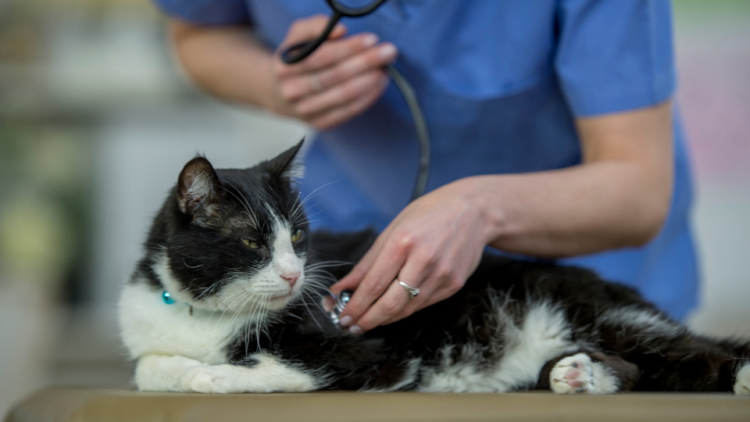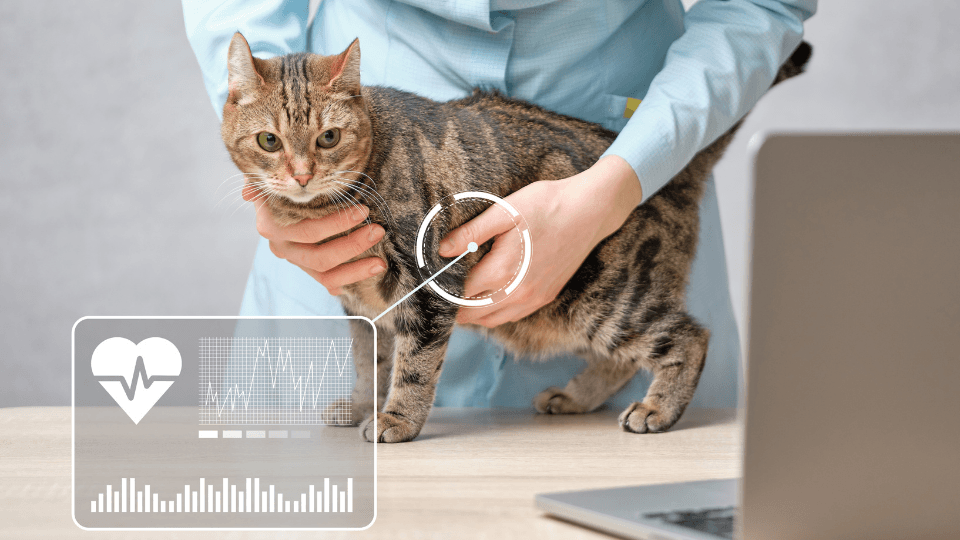A heart murmur is an abnormal heart sound that is usually detected during a routine exam when the veterinarian listens to your pet's heart with a stethoscope. But should it be a cause for concern? Not necessarily. Many healthy felines with a heart murmur never develop any heart issues and go on to lead long and healthy lives.
Read on to find out what causes heart murmur, how serious it is, and what it might mean for your cat.
Table of Contents
- What is a heart murmur?
- Heart murmur in cats symptoms
- What causes a heart murmur?
- What is an innocent heart murmur?
- Heart murmur in kittens
- Diagnosis of heart murmurs in cats
- Treatment for a heart murmur in cats
- Heart murmur in cats life expectancy
- Key Takeaways
Pro Tip: To effectively manage health issues like heart murmur, getting health insurance is highly recommended. Depending on the pet insurance plan, diagnostics, hospitalization, specialist appointments, and surgery may be covered.
What is a heart murmur?
A heart murmur is an abnormal sound that a vet can hear when listening to a cat’s chest, caused by a turbulent blood flow.
Based on the loudness and intensity, vets rank heart murmurs in grades from one to six, with one being softest and six being the most audible. Softer murmurs might only be detectable in one place, whereas the loudest ones can be heard in multiple places on the cat’s body.
A heart murmur doesn’t have to be a reason to panic, but it might indicate a heart condition. Depending on your pet’s condition, the vet might decide to perform additional diagnostic testing in order to determine the cause of the heart murmur.
Heart murmur in cats symptoms
The clinical signs of a heart murmur can vary depending on several factors. In fact, most heart murmurs are asymptomatic until they are advanced. In many cases, symptoms can be very subtle and non-specific, sometimes consisting of weight loss, decreased appetite, weakness, and lethargy.
If the heart disease has progressed, the most common symptoms are associated with fluid build-up in the lungs and might include rapid or difficult breathing, coughing, respiratory distress, and collapse. All these are signs of heart failure.
If you notice these symptoms or anything unusual with your pet, be sure to call your vet as soon as possible.

What causes a heart murmur?
There’s a number of conditions that can cause heart murmurs in cats. Some of them are benign and might not affect your pet's health, while others are serious and potentially life-threatening.
Heart murmurs can be related to structural problems within the heart. Your kitty might have been born with a heart defect (congenital heart disease), such as ventricular septal defect or pulmonic stenosis.
Some cats acquire heart disease later in life. Diseases of the heart muscle or cardiomyopathies can cause abnormal heart function, including a heart murmur.
Heart murmurs in cats can also be associated with conditions outside the heart (extracardiac conditions), such as infection, fever, increased blood pressure, anemia, or hyperthyroidism.
Murmur can also occur in geriatric, emaciated, pregnant, or overweight felines.
What is an innocent murmur?
An innocent or physiologic heart murmur is a benign murmur that is usually asymptomatic and low in intensity. They’re quite common in kittens but adult cats can also have temporary heart murmurs as a result of stress, which causes increased heart rate. This type of murmur disappears when the heart rate is normalized and has no impact on the animal's health.
In general, innocent heart murmurs have a low intensity (usually Grade I or II) and don’t cause any symptoms.
Heart murmur in kittens
One type of innocent or physiologic heart murmur is often found in small kittens, especially in kittens who are growing rapidly. The heart murmur usually first appears at six to eight weeks of age, and usually disappears around four or five months of age. This type of heart murmur is benign.

Diagnosis of heart murmurs in cats
If the murmur was noticed for the first time and your kitty showed no symptoms, your vet might simply recommend that you return for re-evaluation. Many cats are nervous and stressed during the physical examination so the vet will want to see your pet when they’re calmer as the murmur could have been physiologic.
If your cat shows symptoms or the heart murmur seems to be resulting from an underlying issue, the veterinarian will likely order additional diagnostic tests. These may include a complete blood count to detect infections or anemia, blood pressure tests to check for hypertension, chest X-rays to look at lungs and heart, and an electrocardiogram to check the heart rate and rhythm.
The veterinarian might also perform an echocardiogram, i.e. an ultrasound to exam the heart. This might be accompanied by a Doppler examination to help determine the exact location of the cause of the murmur.
Treatment for a heart murmur in cats
Whether the cat's heart murmur needs treatment will depend on several factors, including the cause, the severity of the murmur, how advanced it is, and what symptoms your cat is showing.
Treatment options also vary depending on the cause of the heart murmur. If it is benign, no treatment is required, and your veterinarian will simply monitor your pet's health more frequently. However, if the cat's murmur is a result of an underlying condition, your vet might prescribe medication and/or a special diet. The most commonly used medications are beta-blockers, calcium channel blockers, diuretics, and anti-clotting medications. If the murmur is caused by a congenital disease, the veterinarian might recommend surgery.
Pro Tip: Heart murmur should be monitored, especially in overweight, senior, and pregnant cats. Pet insurance is valuable because it allows you to face issues like this head-on by providing your cat with the best care while minimizing the hit to your bank account.
Heart murmur in cats life expectancy
The prognosis depends on the cause of the heart murmur. If the murmur is innocent, no treatment is needed and the prognosis is usually very good to excellent.
If the murmur is caused by a functional problem that is treatable or by an extracardiac disease, it might resolve over time. If the murmur is caused by cardiac disease, the long-term prognosis will depend on the specific type of cardiac disease.
Depending on the diagnosis, lifestyle changes might be required in order to manage your pet's condition, such as exercise and changes in the diet. Make sure to give any prescribed medications and take your cat for follow-up checkups according to your vet’s instructions.
Key Takeaways
- A heart murmur is an abnormal sound that a vet hears when listening to the cat’s heart through a stethoscope. Not all murmurs should be a cause for concern, but they can indicate underlying heart disease.
- Innocent murmurs are quite common in kittens. They are typically harmless and usually disappear by 4-5 months of age.
- Signs of heart disease in cats include rapid breathing, weakness, lethargy, and collapse.
- To diagnose the cause of a heart murmur, your vet might recommend tests such as blood tests, echocardiograms, and chest x-rays.
- If you have any questions or concerns about your cat’s health, be sure to get in touch with your vet.
